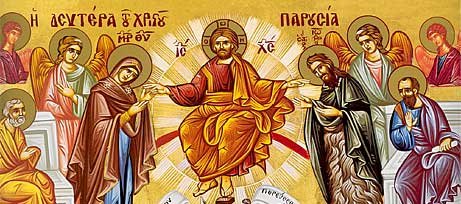 This weekend concludes the week known as Meat Fare. Its name is derived from the traditional Eastern Christian practice of eliminating meat from one’s diet during the Great Fast. The Gospel appointed to be read this weekend, however, is about the Final Judgment. So, unlike the other weekends during the preparation period for the Great Fast, this weekend does not take its name from the Gospel used but, rather, from a common religious practice.
This weekend concludes the week known as Meat Fare. Its name is derived from the traditional Eastern Christian practice of eliminating meat from one’s diet during the Great Fast. The Gospel appointed to be read this weekend, however, is about the Final Judgment. So, unlike the other weekends during the preparation period for the Great Fast, this weekend does not take its name from the Gospel used but, rather, from a common religious practice.
It should be noted that many of the religious practices of the Eastern Church were influenced by monastic practices – the center of liturgical practice for the Eastern Church, Hagia Sophia, was greatly influenced by monks. In fact the structure of our Divine Liturgy was highly influenced by monastic practice.
As you are aware, the weekends within the five week sequence preparing us for the Great Fast, all deal with aspects of metanoia, the primary spiritual effort of the Great Fast. Each week we have been instructed, through the Gospel reading, about metanoia, that process of changing one’s heart and mind to be in closer harmony with the Jesus Way of Living.
So what does today’s Gospel tell us about metanoia? It tells us that the change of heart and mind, which God hopes life’s challenges will bring about within us, deals with how we treat others, especially those who are less fortunate than us. Think about what you heard in the Gospel. The Gospel suggests that we will be held accountable for how we treated and responded to the hungry and the thirsty, the unknown (strangers) and naked and the sick and imprisoned. The Gospel says nothing about personal sins. The Gospel suggests that we will be held responsible for how we treated the least of our brothers and sisters. It clearly states: I assure you, as often as you neglected to do it to one of these least ones, you neglected to do it to me.
Each of us must ask ourselves: What does this truly mean to me? Is my future life truly linked to how I treat others during this lifetime?
The Last Judgment is somewhat misleading: it is an unimaginative scene in which is set the core of the moral teaching of Jesus. It has no parallel in the other Gospels. The substance of this Gospel passage can be paraphrased by saying that humans will be judged entirely on their behavior toward their fellow men. The evasion that this does not include man’s duties toward God is met in this passage: Jesus identifies himself with those to whom service is given or refused, and their behavior toward men is their behavior toward God.
We do well to think about this!
